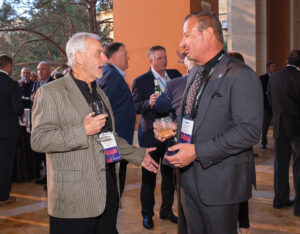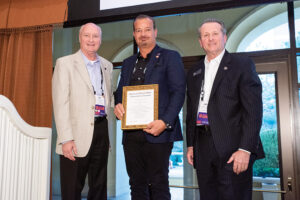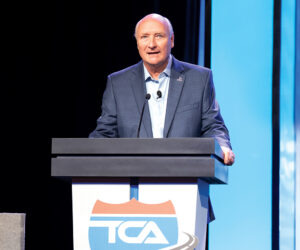The popularity of sports on television means big bucks for major league baseball (MLB), the National Football League (NFL), the National Basketball Association (NBA), college football leagues, and the NCAA basketball tournament, among others. Of course, the advertisers who are making those big payouts expect a return on their investment — which translates to pauses in the action while they tout their products. That’s a lot of pauses. For instance, the Wall Street Journal took a stopwatch to three MLB games of varying overall length and found the average three-hour game includes less than 18 minutes of actual baseball action. Other reviews show only 60 minutes of action and a 12-minute halftime in NFL games, which take over three hours. However, evidenced by Truckload Carriers Association (TCA) Chairman John Elliott’s Chat that follows, there are no pauses in the action for the TCA chairman. Since we last spoke, he’s been to the Safety & Security and Refrigerated meetings as well as to the annual Officers Retreat. In early September, he’ll head to Washington for the Fall Business Meetings and Call on Washington — all the while taking time to answer questions about issues that are important to the truckload industry.
Mr. Chairman, you are now halfway through your term. Will you give us an update on how you think things are going? Also, what is on the agenda for the last half of your term?
Things are going very well! The first half of the year has flown by. There are many new and exciting things happening at Truckload Carriers Association (TCA). Our leadership team in D.C. has done an amazing job of strengthening value and positive outcomes for our membership. Our annual Safety & Security Division Conference was a remarkable success, featuring one of our largest turnouts ever. I just came back from our Refrigerated Division Meeting in Traverse City, Michigan, and could see first-hand the progress made on our educational and networking offerings. The officers of both divisions deserve tremendous credit. They helped provide and solicit feedback to better focus the content to serve member needs more directly. Doing that was a win for our great carriers, as well as for our first-rate sponsors and vendors.

As we speak, you are in Cancun for the annual Officers’ Retreat. What is the value of this meeting, and what are some of the discussion points on the agenda?
The annual Officers’ Retreat is really the time where TCA leadership can sit down for an extended period, in person, and develop the association’s priorities for the coming year. Our goal is always to focus on the needs of our members to set the guidance for our staff. Being a member-driven organization, providing direction and reinforcing the mission is critical to the success of TCA. We will review our successes and look to build upon them, while also addressing areas of concern. This is especially important as we prepare for our Fall Business Meetings, the Call on Washington, and the Annual Convention next March.
In June and July, TCA held its annual Safety & Security Meeting and Refrigerated Meeting. What were some of the highlights of both events?
I had the privilege of attending and speaking at both events. It is always great to see people face to face, and I was impressed with the content and the overall excitement at both events. It is a pleasure to see members talking and sharing ideas and best practices. I think our members recognize everything we do to improve our companies, which in turn improves our industry. A strong industry is good for everyone, especially when you look at common goals such as promoting safety.
Speaking of safety, three articles have recently crossed our desk. The National Highway Traffic Safety Administration (NHTSA) is addressing speeding through the Speeding Wrecks Lives campaign. The Governors Highway Safety Association (GHSA) and General Motors have released a report with the goal of changing the social norm around distracted driving. Finally, according to the Commercial Vehicle Safety Alliance (CVSA), 14.1% of commercial motor vehicles stopped during a one-day, unannounced brake safety day were put out of service. Speak to the importance of changing attitudes with respect to speeding and distracted driving, and the need to be diligent in making sure equipment is in good condition.
It is no secret that the industry’s accident trends are going in the wrong direction, and as motor carriers we are the ones in the best position to reverse the negative habits. Speed and distracted driving continue to be a top cause for industry accidents, and it remains our responsibility to enforce safe driving habits for our fleets so that, at the end of the day, our drivers can make it home to their families and we can assure the same for the people with whom those drivers share the road. Maintaining vehicle operations is paramount for the growth and success of your fleet. Poorly maintained vehicles are the building blocks to a bad future — which is precisely why those vehicles are placed out of service. Quality training, coupled with proper fleet policies regarding hiring, maintenance, and safety, goes a long way toward ensuring the safety of your driving force and improving the performance of your fleet.
The 2022 mid-term elections are only two months away. As of mid-August, the website Real Clear Politics shows the Senate race at 47-47, with four Democratic seats and four GOP races rated as toss-ups. In the House, the website shows Republicans leading with 221 seats to 181 for Democrats. Twenty-seven Democratic seats and five GOP seats are rated as toss-ups. Only 218 seats are needed for a majority in the House. What is the significance of the mid-term election with respect to how it relates to the trucking industry?
The trucking industry is one of the major players in the U.S. economy, so any election can have major implications to an industry that touches everything this nation consumes. Typically speaking, TCA must collaborate with leaders from both sides of the aisle on just about everything we aim to accomplish. While we can interpret the typical political landscape and how it may affect us, we must continue to recognize that our industry has friends in both major political parties. Certainly, there are some issues that resonate better than others. As an industry as vast as trucking, and in a segment as large as truckload, we must always pay close attention to the political changes that occur in every election so we can better communicate the policies of the association and needs of the membership.
One of the key issues in the election is global warming. To that end, the Federal Highway Administration (FHWA) has announced a Notice of Proposed Rulemaking (NPRM) for states and municipalities to track and reduce greenhouse gas emissions, including reducing idle time for big rigs at America’s ports. Overall, what is trucking’s responsibility in reducing greenhouse gas emissions?
TCA is committed to protecting the environment and continues to invest in experimental equipment that seeks to reverse the trend of climate change. That said, we remain diligent in developing equipment that is actually available and effectively works to deliver our nation’s freight. However, we must continue to remain practical in terms of the effects that these changes have on our industry and the reality that currently exists on our roadways. Putting the proverbial cart before the horse is not a good idea for anyone. To ensure our environment is truly protected and emissions are kept in check, zero-emissions equipment must be widely available and sustained by an infrastructure designed to suit the needs of an industry that travels across the entire nation. Trucking remains the most flexible mode of freight delivery in this nation, and our fleets must possess the ability to reach every corner of this country and back again.

Two of the most important (and newest) events on TCA’s calendar are the Annual Fall Business Meetings and Call on Washington, scheduled for September. The business meetings will be held September 12 at the Hyatt Regency Washington on Capitol Hill, and the Call on Washington September 13 on Capitol Hill. For those who haven’t yet made a decision to attend, what words of encouragement would you offer? Do you feel this would be an opportunity to get more involved by joining a committee?
I cannot stress enough how getting involved is the best way to maximize the value of membership. The members who are involved become the most enthusiastic and passionate spokespeople for our organization and the industry. The Call on Washington is a prime opportunity for our members to get face to face with the lawmakers who are shaping policy. They need and appreciate constructive feedback from TCA and its members, and especially their constituents. We cannot expect our elected officials to make the correct decisions about our industry if we do not engage and educate them on the issues that matter most to TCA. As an industry we have to continue to tell our story, and the Call on Washington is a great way to do so.

At the business meeting, there will be discussions about TCA policies and industry issues. Let’s take a look at some of those and get your perspective on them. First, there is the ongoing issue of speed limiters. How strong is the sentiment among trucking stakeholders to finally write and implement a speed limiter rule?
We touched on this earlier, but it is no secret that speeding is a large factor in causing accidents. As major users of the national highway system, it becomes our responsibility to maintain safe speeds. One of the more interesting facets of FMCSA’s Notice of Intent or Advanced Supplemental Notice of Proposed Rulemaking was there is no real target speed at which FMCSA has taken aim, but rather it is requiring the industry to let them know where they stand. Over 15,000 comments had been submitted to the docket, demonstrating that — good or bad — this notice is quite popular. However, it is also fair to note that today’s speed limiters are not what they were when they were first introduced. Many carriers have developed speed control programs that are designed with the driver in mind, that can allow for additional mph for certain amount of time if and/or when it could be needed. In fact, the more technology evolves, the greater flexibility can be allowed to our driving force when implemented. In some cases, speed limiters can govern speeds based on the location in which the truck is operating. If a driver is in a 25 mph zone, the limiter can adjust to the roads the truck is traveling on. They’re very different from the “set it and forget it” speed limiters of yesterday. Flexibility for our industry has always been a necessity, and that rings just as true with a potential speed limiter rule.
Second, there is the issue of parking. The House Committee on Transportation and Infrastructure has approved legislation designed to expand the truck parking infrastructure across the nation. Could this be a catalyst for solving a decades-long problem?
Yes. We are working to ensure it is the catalyst for change that we believe it could be. Truck parking has been identified as the No. 1 issue for professional truck drivers on the road today. Operating during a supply chain crisis, where drivers in the industry are averaging six and half hours of drive time per day, providing better access and availability to safe and secure truck parking would free up time in the long run to advance loads farther and improve freight efficiencies. Additionally, it could make our industry more attractive to those looking for a new, rewarding career. Dedicating dollars toward truck parking is an opportunity our representatives in Congress can all get behind. While the infrastructure bill did allocate some discretionary funding toward the states that can be used for this issue, real dollars — to the tune of $755 million over four years — that the T&I committee voted up can go even further toward improving upon this critical issue.
Next, could you bring members up to date on progress of the Federal Motor Carrier Safety Administration’s (FMCSA) Young Driver Program, which could eventually lead to 18- to 20-year-olds being allowed to drive interstate routes? Also, what do you hear from members about the possible effectiveness of this program?
Most likely, by the time this chat gets into print, FMCSA will have begun accepting applications from carriers that are interested in participating in the pilot program. For those that have expressed an interest, I know they are looking forward to exposing their operations to a demographic that has yet to learn how rewarding our industry can be. There certainly are concerns regarding the reporting aspects of the pilot program and whether it will be a detriment to those who are participating. However, as an industry, in the long run, carriers that do hire these drivers could find themselves in the rewarding position of growing their fleet.
The image of the trucking industry is always an issue. What is TCA currently doing to improve trucking’s image, and what are other ideas members have mentioned that could help in this area?
Image is everything! As an industry, trucking finally enjoyed the positive spotlight it always deserved during the COVID-19 pandemic. Our drivers and staffs have stepped up in times of great adversity to keep the supply chain running and our country moving. However, we cannot take our foot off the gas. In the past, memories have been short-lived. At TCA we must continue to push the positive narrative of our industry, from programs like Highway Angels, Driver of the Year, and Owner-Operator of the Year, and providing a large bank of scholarships to the students whole deserve them and continue to support and participate in great causes such as the Capital Christmas Tree and Wreaths Across America, just to name a few. There will also be discussion about membership campaigns. To this end, TCA has formed the Champions Club to highlight and celebrate those who refer companies for association membership.
Share the importance of referrals in helping the organization grow and improve.
Referrals are everything. Just like in our individual trucking companies, drivers referring drivers is the single best source of recruiting. The same can be said about membership at TCA. When members tell the story of TCA and the value the organization brings to them, it underscores an authenticity that cannot be beat. That connection and trust help us sustainably grow membership. We are reaching all-time high numbers and continue to grow. As our membership grows, so do our resources and reach, which allows us to create an even more attractive ROI for our members.
Thank you, Mr. Chairman, and we’ll see you in Washington.
Lyndon Finney’s publishing career spans over 55 years beginning with a reporter position with the Southwest Times Record in Fort Smith, Arkansas, in 1965. Since then he’s been a newspaper editor at the Southwest Times Record, served five years as assistant managing editor of the Arkansas Democrat-Gazette in Little Rock and from November 2004 through December 2019 served as editor of The Trucker. Between newspaper jobs he spent 14 years as director of communications at Baptist Health, Arkansas’ largest healthcare system. In addition to his publishing career he served for 46 years as organist at Little Rock’s largest Baptist church.











